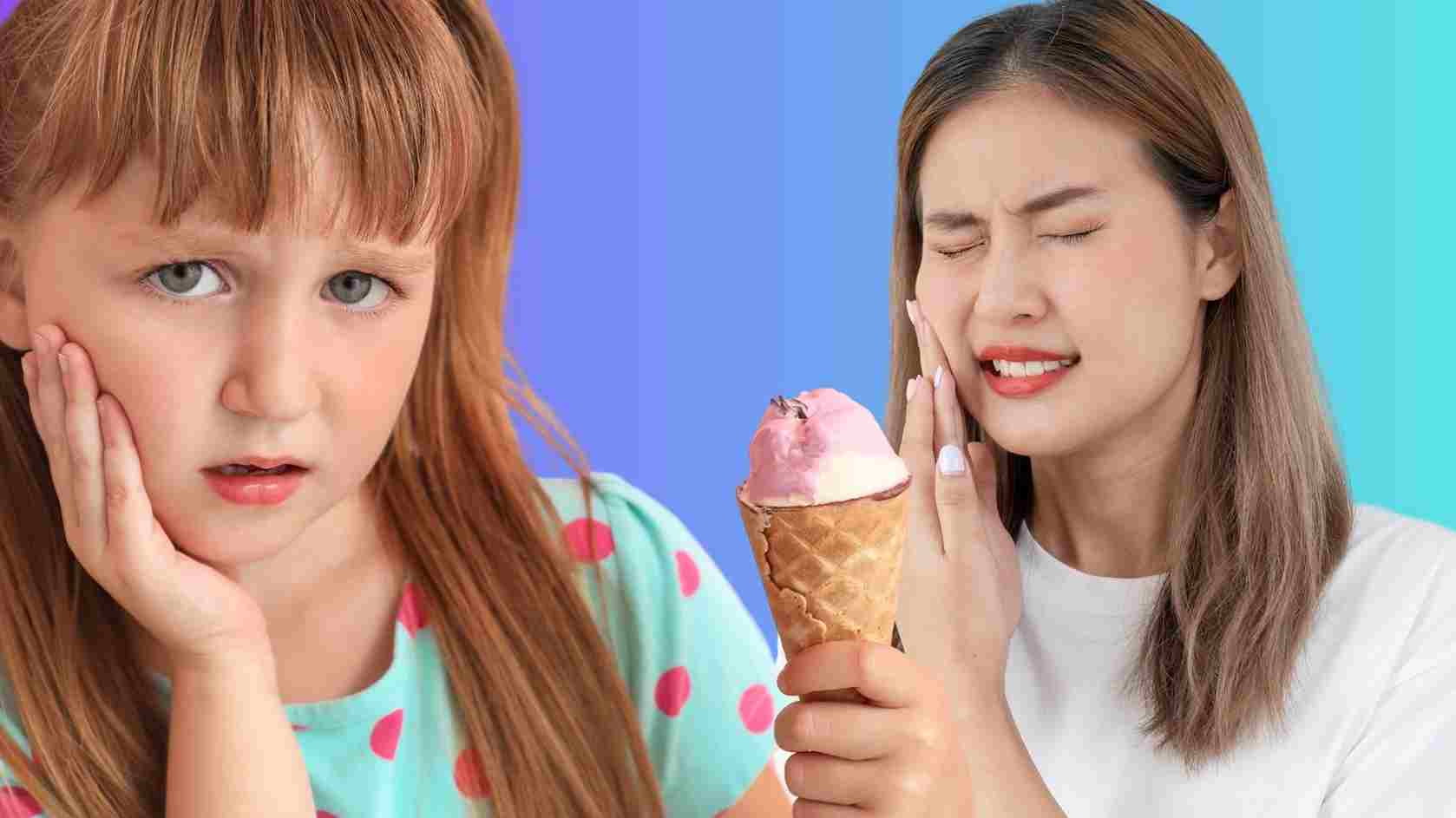Does Tea Stain Your Teeth?
Yes, tea can stain your teeth. This is primarily due to the presence of tannins, which are natural compounds found in tea.
Tannins have the ability to adhere to the enamel on your teeth, leading to discoloration or staining over time. The degree of staining can depend on the type of tea and the how frequently you consume it.
Black tea, for example, is known to have a higher potential for causing stains due to its higher tannin content compared to green or white teas. To minimize staining from tea, consider rinsing your mouth with water after drinking tea, reducing the amount of tea you consume, or adding a dash of milk.
Further, maintaining good oral hygiene by brushing twice a day and visiting your dentist regularly can also help manage and reduce the appearance of tea stains on your teeth.
In this article, I'll explain everything you need to know about tea stains on your teeth, how to prevent them, and how to remove them.
Why do tea and coffee stain teeth?

Drinking coffee and tea can stain your teeth because they contain tannins, plant-based compounds that adhere to your tooth enamel, the outer layer of your teeth. With each sip, these tannins stick to and gradually penetrate the microscopic pits and ridges on your teeth's surface, leading to tooth discoloration.
This tooth discoloration is often characterized by brown stains or yellow stains on your dental enamel.
Further, the acidity in these beverages exacerbates the issue by etching the enamel, creating more crevices for tannins to latch onto and making your teeth more susceptible to discoloration. Acidity can also wear down your enamel over time, making it thinner and allowing the darker dentin beneath to become more visible. This can make your teeth appear more "yellow" even if they are not truly stained teeth.
While tea is not bad for your teeth, to combat these effects, consider moderating your tea and coffee intake and using a straw to minimize direct contact with your teeth. Plus, you should always rinse your mouth with water after enjoying these beverages to reduce the potential for teeth stains.
Most importantly, remember to brush your teeth twice per day with nano hydroxyapatite toothpaste since nano hydroxyapatite can whiten teeth.
Does chamomile tea stain teeth?
Chamomile tea is generally light in color, but it can still cause mild staining on teeth over time.
While it’s less likely to stain compared to darker teas like black or green tea, chamomile contains tannins that may gradually discolor enamel.
Research indicates that tannins can bind to tooth surfaces, creating a yellowish tint if consumed frequently.
Additionally, chamomile’s slightly acidic nature may weaken enamel, making teeth more prone to staining from other foods and drinks.
A 2020 study on herbal teas found that prolonged exposure to certain blends, including chamomile, can contribute to surface discoloration.
To minimize staining, consider rinsing your mouth with water after drinking chamomile tea and maintaining regular oral hygiene practices.
Using a remineralizing toothpaste can also help protect your enamel and reduce the risk of stains.
How to Avoid Tea Stains on Your Teeth

Avoiding tea stains on your teeth involves a few strategic habits that can help maintain a bright smile without having to give up your favorite beverage. Let's walk through some of them now.
Rinse with Water
After enjoying a cup of tea, make sure to rinse your mouth with water. This simple step helps wash away tannins and pigments that cause staining before they have a chance to settle on your teeth.
Use a Straw
When possible, drink tea through a straw, especially if you prefer iced tea. This method reduces the amount of liquid that comes in contact with the visible front surfaces of your teeth.
Add Milk
Research suggests that adding milk to your tea may reduce its staining potential. This may be because the proteins in milk inhibit the tannins in tea and prevent stains.
Maintain Good Oral Hygiene
Brush your teeth at least twice a day with nano hydroxyapatite toothpaste and use expandable dental floss daily. You can also consider using a whitening toothpaste, though some dental professional consider it bad as it can erode away enamel.
Thankfully, regularly brushing with nano hydroxyapatite toothpaste helps remove surface stains and prevents them from setting in without causing damage. Plus, remineralizing toothpaste can prevent tooth decay which can also cause the appearance of tooth stains.
Further, make sure you drink tea before brushing teeth, instead of after. This will allow your toothpaste to remove stains before they set in overnight.
Choose Lighter Teas
Darker teas, like black tea and oolong, tend to stain teeth more than lighter teas, such as drinking green tea or white tea.
Further, research suggests that black tea stains are more difficult to remove than say, a green tea stains.
Try opting for lighter varieties, like green teas, which can reduce your risk of staining and it's good for your teeth.
Professional Dental Cleanings
Of course, it's important to see a dentist regularly for a professional cleaning. Your dentist or hygienist can remove surface stains more effectively than at-home care and can offer advice or teeth whitening treatments to further reduce staining.
You can also consider using natural whitening strips at home as needed for a quick, effective way to remove stains from tea.
How to Get Rid of Tea Stain on Your Teeth

To get rid of tea stains on your teeth and potentially brighten your smile, incorporating nano-hydroxyapatite toothpaste into your oral hygiene routine can be an effective strategy.
But that's not all! Let's walk through some of the key tactics you can use to remove tea staining.
Use Nano Hydroxyapatite Toothpaste
While nHA toothpaste is not a bleaching agent like hydrogen peroxide, studies show its ability to remineralize and repair enamel can lead to a brighter appearance of the teeth.
Plus, smoother, healthier enamel reflects light better, which can make your teeth look whiter and reduce the visibility of stains.
Try Whitening Strips
Whitening strips are a popular and effective option for removing teeth stains and achieving a brighter smile. These thin, flexible strips are coated with a whitening gel that typically contains hydrogen peroxide or carbamide peroxide as the active ingredient
Whitening strips are effective for many people, offering noticeable whitening by several shades. They are particularly good at addressing stains from coffee, tea, wine, and smoking.
Professional Cleaning
Regular visits to the dentist for professional cleanings can remove surface stains more effectively than brushing alone. Dental hygienists use specialized tools and techniques to gently remove plaque and stains, including those caused by tea.
Daily Oral Hygiene
Brush your teeth at least twice a day and floss daily. You should consider using an electric toothbrush with a whitening head to enhance stain removal.
Dietary Adjustments
Limit or avoid foods and beverages known to stain teeth, and consume them in moderation. When you do indulge in tea, follow it with water to help rinse away staining compounds or brush your teeth afterward.
Whitening Treatments
For more stubborn stains, consult with your dentist about professional whitening treatments. These treatments can offer more dramatic results than over-the-counter products.
What other foods and drinks stain teeth?

Besides tea and coffee, several other foods and drinks can stain your teeth due to their high pigment content, acidity, or both. Here are five of the most common offenders:
-
Red Wine: Known for its high tannin content, red wine can leave noticeable stains on your teeth, giving them a dull, grayish hue over time.
- Whiskey: Dark whiskey varieties contain tannins and chromogens that can stain teeth over time.
-
Colored Sodas: Dark-colored sodas contain acidic compounds and chromogens, pigments that can cling to tooth enamel and cause staining.
-
Berries: Blueberries, blackberries, cranberries, and other dark-colored berries, whether eaten whole, in jams, or as juice, can stain teeth due to their intense color and acidity.
-
Tomato-Based Sauces: Tomatoes are acidic and have strong natural pigments, making tomato-based sauces like pasta sauce and ketchup potential teeth stainers.
-
Curry: This flavorful spice, common in Indian cooking, is known for its deep pigmentation, which can yellow teeth over time.
Now remember - you don't have to completely avoid these foods, but be mindful of their potential to cause discoloration. Try consuming them in moderation, and brush your teeth regularly to prevent staining.
What tea that doesn't stain teeth?
Herbal teas like chamomile, rooibos, and peppermint are less likely to stain teeth because they contain little to no tannins, the compounds responsible for discoloration.
White tea is another good option, as it is minimally processed and has a lighter color compared to black or green tea. Research indicates that teas with lower acidity and lighter pigments are gentler on tooth enamel and less likely to cause staining.
Drinking tea through a straw or rinsing your mouth with water afterward can further reduce the risk of stains. Additionally, maintaining a consistent oral hygiene routine helps minimize any potential discoloration.
Choosing these lighter teas ensures you can enjoy their benefits without compromising the brightness of your smile.
Frequently Asked Questions
Does tea stain your teeth?
Yes, tea can stain your teeth. Tea contains tannins, which are organic substances that can cause staining by sticking to the enamel of your teeth. Darker teas, such as black tea, and teas with added ingredients like berries or spices tend to have more staining potential. However, herbal teas and lighter teas like green tea can also contribute to staining over time. Regular brushing and dental care can help minimize the staining effects of tea consumption.
Can you remove tea stains from teeth?
Yes, you can remove tea stains from teeth. One option is to use nano-hydroxyapatite toothpaste, which is safe and can whiten teeth by remineralizing enamel and reducing surface stains. Additionally, whitening strips can be effective in removing tea stains by bleaching the enamel. Another option is to consider professional teeth whitening treatments. It's important to maintain good oral hygiene and moderate tea consumption to prevent future staining. Consulting a dentist can help determine the most effective method for your individual needs.
How can I protect my teeth when drinking tea?
To protect your teeth when drinking tea, try using a straw to minimize contact with your teeth. After drinking tea, rinse your mouth with water to wash away residue. Brush your teeth regularly with nano-hydroxyapatite toothpaste to remove stains. Limit tea consumption, especially darker varieties, and consider opting for lighter teas. These practices can help prevent staining and maintain the whiteness of your teeth.
Is there a tea that doesn't stain teeth?
Yes, there are certain teas that are less likely to stain teeth compared to others. Lighter teas such as white tea and some green teas contain fewer tannins, which are compounds responsible for staining. Herbal teas, like chamomile or peppermint, also generally have lower staining potential. However, it's important to note that any tea, even lighter varieties, can still contribute to staining over time if consumed regularly. Practicing good oral hygiene and moderating tea consumption can help minimize staining effects regardless of the type of tea you choose.
How do I keep tea from staining my teeth?
To prevent tea from staining your teeth, consider using a straw to minimize direct contact. After drinking tea, rinse your mouth with water to wash away residue. Brushing regularly with whitening toothpaste helps remove surface stains. Limiting tea intake, especially darker varieties, can also reduce staining. Practicing these habits can help maintain the whiteness of your teeth while enjoying tea.
Is tea worse than coffee for staining teeth?
Tea generally stains teeth more than coffee. Both beverages contain staining compounds, but tea contains higher levels of tannins, which can lead to more significant staining. However, factors such as frequency of consumption, additives, and oral hygiene habits also influence staining effects.
Should I brush teeth after tea?
Yes, it's generally a good idea to brush your teeth after drinking tea. Brushing helps remove any residue or staining compounds from the surface of your teeth, reducing the likelihood of stains setting in. However, it's advisable to wait at least 30 minutes after consuming acidic beverages like tea to brush, as immediate brushing can potentially damage softened enamel. Rinsing your mouth with water immediately after drinking tea can also help minimize staining until you're able to brush.
Does milk tea stain teeth?
Milk tea, especially varieties that contain dark-colored ingredients like black tea or certain flavorings, can potentially stain teeth over time. The tannins present in tea, along with other pigments, may contribute to tooth discoloration if consumed regularly and not followed by proper oral hygiene practices. Additionally, milk tea often contains added sugars, which can further increase the risk of tooth staining and decay if consumed excessively. Practicing good oral hygiene, such as brushing your teeth after consuming milk tea or using a straw to minimize contact with teeth, can help mitigate potential staining effects. Regular dental cleanings and check-ups are also important for maintaining oral health.
What tea doesn't stain teeth?
While no tea is entirely free from the potential to stain teeth, some types are less likely to cause significant staining compared to others. White tea, for example, is less likely to stain teeth because it undergoes minimal processing and contains fewer tannins than black tea. Herbal teas such as chamomile, peppermint, or rooibos are also generally less likely to cause staining because they do not contain the same staining compounds found in black or green teas. However, it's important to note that individual factors such as oral hygiene habits and the frequency of tea consumption can also influence the extent of staining.
Does chamomile tea stain you teeth?
Chamomile tea is typically considered less likely to stain teeth compared to other teas like black or green tea. Chamomile tea is a herbal infusion made from dried chamomile flowers and generally contains fewer pigments and tannins that contribute to staining. However, like with any beverage, frequent consumption or prolonged contact with teeth can potentially lead to minor staining over time. Practicing good oral hygiene habits such as regular brushing and rinsing with water after drinking tea can help minimize any potential staining effects.
What can I drink that won't stain my teeth?
Water, milk, and clear beverages like white tea or herbal teas are great options for preventing teeth stains. These drinks are gentle on enamel and less likely to leave discoloration. Avoiding dark liquids such as coffee, soda, or red wine helps maintain a brighter smile.
What tea can I drink when whitening my teeth?
Green tea and white tea are good choices when whitening your teeth, as they are less likely to cause staining. These teas contain antioxidants that can support oral health while being gentler on enamel compared to black tea. Drinking them without sugar can also help avoid additional staining.
How to prevent teeth stains with tea?
To prevent tea stains, try using a straw to limit the liquid's contact with your teeth. Rinsing your mouth with water after drinking tea can also reduce the risk of stains. Regularly brushing your teeth, especially after drinking tea, helps remove any buildup before it causes discoloration.
Is carbonated water okay for your teeth than tea?
Unsweetened carbonated water is generally less harmful to teeth than tea, especially dark teas that can stain enamel over time. However, flavored or acidic carbonated water may contribute to enamel erosion. Tea, particularly green or white tea, contains antioxidants and fluoride that can benefit oral health. To protect your enamel, consider using a nano-hydroxyapatite toothpaste to help strengthen and remineralize your teeth.






















